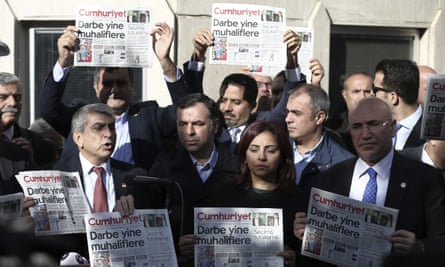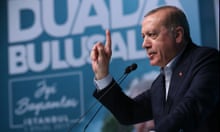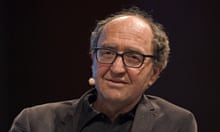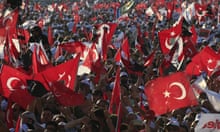In Turkey we observe how even tragedy plays a role in manipulative government and post-truth repression. The terrorist outrage last week in central Istanbul, which left 38 dead and 166 wounded, was the 31st terror attack in the last year and a half. And it was the 31st time the country had followed exactly the same routine: shock, followed by a ban on news that was augmented by calls for national unity from official spokesmen, and then a statement from the president paving the way for social media trolls to target anyone who questions the government.
Recep Tayyip Erdoğan’s administration is not inclined to be deflected by crisis. Immediately after the attack, Burhan Kuzu, a law professor and senior adviser to the president, went on social media to celebrate constitutional proposals that would expand the president’s powers, and maybe see Erdoğan in power until 2029 – “so no system change can happen without blood”.
After the 28 June attack on Atatürk airport, the diversionary tactic was to mask the national shock with celebrations of a newly built bridge. The scene of the latest terrorist attack has been quickly woven into the narrative. Henceforth it will be known as the Hill of Martyrs.
It pays to acquiesce; indeed it has become essential. This week a young boy grieving at the funeral of his father, killed in the latest attack, was seen to look at President Erdoğan in a not-so-admiring way. Government supporters are now calling for an investigation into the entire family.
This refashioning of a post-truth, post-fact Turkey has not happened overnight. The process has involved the skilful and wilful manipulation of narratives. We gave up asking the astonished questions “How can they say or do that?” some time ago. Truth is a lost game in my country. In Europe and America, you still have time to rescue it – but you must learn from Turkey how easily it can be lost.
It started 15 years ago, with a phenomenon that will now be familiar to you, when intellectuals and journalists reacted to a nascent populism with the self-critical question: “Are we out of touch?” To counter that possibility, they widened the parameters of public debate to include those who were said to be representatives of “real people”. We thought our own tool, the ability to question and establish truth, would be adequate to keep the discourse safe. It wasn’t. Soon we were paralysed by the lies of populism, which always sounded more attractive than our boring facts.
We found, as you are now finding, that the new truth-building process does not require facts or the underpinning of agreed values. We were confronted – as you are being confronted – by a toxic vocabulary: “elite”, “experts”, “real people” and “alienated intellectuals”. The elite, with experts as mouthpieces of that oppressive elite, were portrayed as people detached from society, willing to suppress the needs, choices and beliefs of “real people”.
Events moved quickly. Those who believed experts should be excluded from the truth-building process, and that the facts were too boring to be bothered with, became the most active participants in a reconstruction of their own truth. The magic word was “respect”, with the demand that the elite, since they were so out of touch, should respect real people’s truth.
There is an irony to be noted here, as it says much about Erdoğan’s Turkey. One of the first to advocate Karl Popper’s idea of letting the common people construct the truth was the commentator Şahin Alpay. He is now 74, seriously ill and in prison – because this mobilised and organised ignorance has no time for any kind of intellect, even that which helped it capture the political stage in the first place.
What is the practical effect of this new truth on everyday life? Well, consider one example. In Turkey today, we are obliged to indulge a debate about whether minors should be married to their rapists. It is predicated on the “real people’s” truth that in rural areas girls get married even when they are just 13, and thus have sexual maturity. It is, we are told, a thoroughly elitist argument to insist that a minor cannot give consent.

We have learned a lesson, but too late. The question “Are we out of touch?” leads to “them and us”, which then morphs into “either us or them”. As we found in Turkey, the masses choose “them”. From that point you find yourself, like me, labelled “not real people” in your own country. Europe and the US will soon learn that being “elite” is not about social class or education: it is about obedience to one version of the truth.
Prepare for your own version of this. The other week, in Copenhagen, I attended NewsXhange, an international gathering of the media to discuss redefining journalism when trust is at an all-time low. The opening symposium was titled “Are we out of touch?”. There to prove that indeed we were was a jubilant figure well known to you in Britain – the former Ukip leader Nigel Farage. You have no idea about real people, he said, before offering us some gracious lessons on how he saw real journalism. One by one, panellists and members of the audience sought to corner him with references to fact-checking and double fact-checking, to holding politicians to account and doing better journalism. They tried to embarrass him by calling him a xenophobe.
And as he spoke, I looked at the expressions on the faces in the audience, and recognised them. They were our faces from 15 years ago, amazed at his audacity, wondering: how can he say that? – unsure whether to mock his twisted logic or to take it seriously.
An analogy came to mind: that this is like trying to play chess with a pigeon. Even if you win within the rules, the pigeon will clutter up the pieces, and finally it will shit on the chessboard, leaving you to deal with the mess. Farage, having told us to “cheer up”, and that this was “not a funeral”, did exactly that. Having dumbfounded the audience, he announced – as if fleeing a boring party – that he was off to meet Donald Trump in Washington.
Be warned. For 15 years we played chess with the pigeon in Turkey, but now we don’t even have the chessboard. Some of you still have time to shape your future. Use it.









